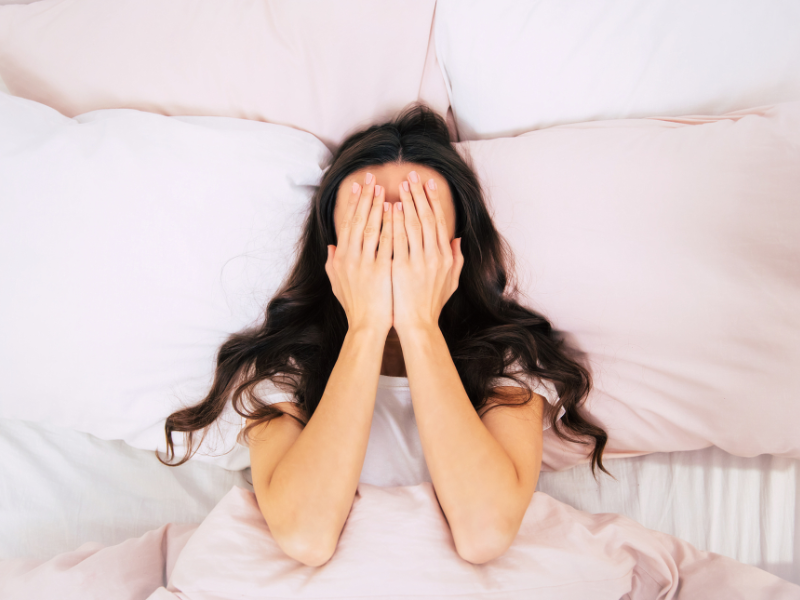Heatwave : 3 tips for better sleep

As summer temperatures rise, sleep becomes a real challenge. Restless nights, difficulty falling asleep, frequent awakenings: heat alters the quality of rest, which is essential for physical and mental balance. In a professional context, this lack of recovery can have an impact on concentration, productivity and the overall well-being of employees. It is therefore essential to implement practical solutions to maintain sleep quality, even in the middle of a heatwave.
Why does heat disrupt our sleep?
To fall asleep, our bodies naturally have to lower their internal temperature, generally around 36°C, which signals to the brain that it’s time to switch to rest mode.
But in hot weather, this balance is difficult to achieve. The hot ambient air prevents the body from evacuating excess heat. In response, the body begins to sweat in an attempt to cool itself down. This process, although natural, keeps the body active and prevents the state of relaxation necessary for falling asleep.
The result: it takes longer to fall asleep, sleep cycles become irregular and night-time awakenings are frequent. In addition to altering the falling-asleep phase, heat also affects the quality of deep sleep and REM sleep, two phases essential to physical and mental recovery.
However, there are simple, effective solutions to help you sleep better, even when temperatures rise.
Prepare your bedroom :
During heatwaves, your bedroom can quickly become an oven. To keep your room as cool as possible, keep curtains, shutters and windows closed during the day to prevent hot air from entering. Conversely, in the evening, as soon as temperatures start to drop, open the windows wide to create draughts. If possible, leave them ajar overnight to facilitate air circulation. An air conditioner can be very useful, but if it’s not properly adjusted, it can cause heat shock or a night-time cold. To stay safe, limit the temperature difference between indoors and outdoors to 5°C maximum. As for the fan, it should never blow directly on you at night. The trick? Place a damp sheet in front of the fan to accentuate the sensation of freshness while slightly humidifying the air.
Cooling your bed effectively :
You can act directly on your bedding to improve your comfort :
- Place your sheets or pillowcases in a plastic bag and leave them in the freezer for a few minutes before going to bed.
- Slip a hot-water bottle filled with fresh water (pre-cooled in the fridge) at the foot of the bed.
- Choose 100% cotton bed linen, which is much more breathable than synthetics or silk.
- Opt for lightweight sleepwear made from natural fibers that allow the skin to breathe.
Finally, consider innovative accessories such as cooling pillows or mattress toppers. Some models contain cooling gel, while others use cooling foam.
Adopt the right gestures before bedtime :
- Avoid preconceived ideas : Some “refreshing” reflexes are actually counter-productive. This is the case with cold showers just before bedtime: they cause a rebound effect, encouraging the body to produce more heat. Prefer a lukewarm shower, which will help lower body temperature without unbalancing the body’s natural mechanisms.
- Stay well hydrated : Drinking enough fluids is essential to compensate for the water lost through perspiration. Make sure you’re well hydrated before going to bed, and keep a glass of water close at hand during the night. But be careful not to drink too much just before going to bed, to avoid waking up at night with the urge to urinate.
- Eat lightly for a soothed sleep : Hearty meals raise body temperature and slow down the onset of sleep. In summer, it’s best to opt for fresh, light meals: salads, crunchy vegetables, water-rich fruit. Avoid fatty dishes, which weigh down digestion and generate internal heat.
- Relaxing to beat the heat : Stress and heat form a formidable duo against sleep. Before going to bed, take the time to establish a relaxation routine. Simple conscious breathing (inhale through the nose, exhale slowly through the mouth, relaxing the body) slows the heart rate and prepares the brain for sleep. You can also practice visualization: imagine a soothing, cool place, such as a beach at sunrise or a shady forest. This technique draws your attention away from the heat and helps you fall asleep more gently.
Conclusion:
Even in the heat of the day, it’s possible to get a good night’s sleep. With a few simple, but targeted measures. These practical solutions will help you stay healthy and productive, whatever the weather. Because a good night’s sleep is the key to a successful day.